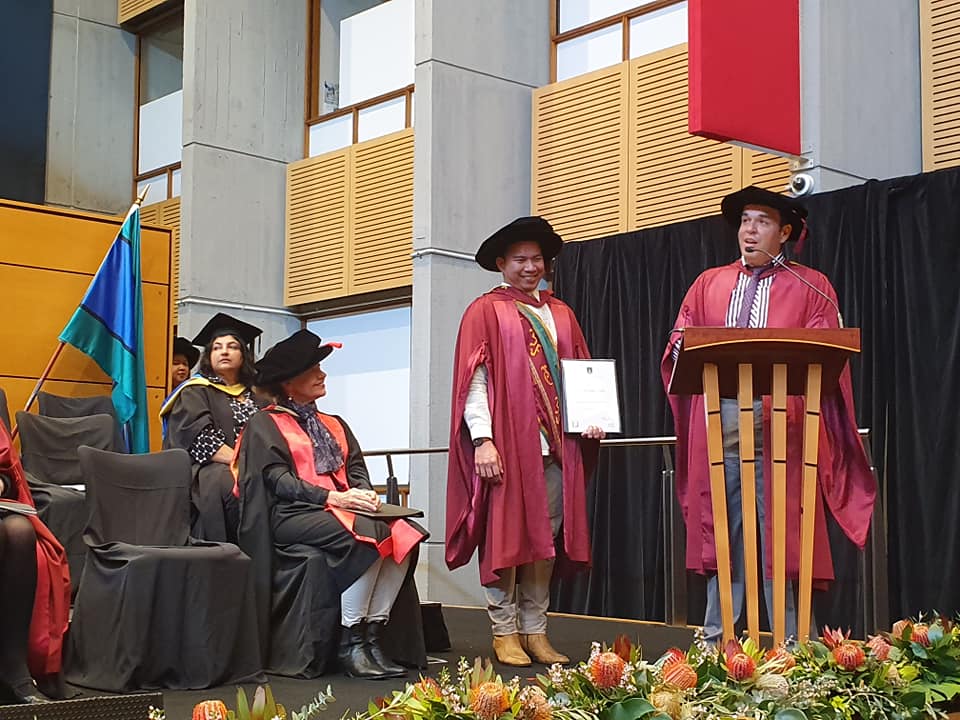Yves Aquino’s speech starts at 1:22:55
Graduation Speech 2019
19 September 2019, 10:30am
By Dr Yves Saint James Aquino
Deputy Chancellor, members of the University, fellow graduates and guests.
I acknowledge the traditional custodians of the land on which Macquarie University stands—the Wattamattagal clan of the Darug nation—whose cultures and customs have nurtured and continue to nurture this land since the Dreamtime. I pay my respects to Elders past and present.
It is an honour to speak on behalf of the students who are graduating today. It would be impossible to completely capture the meaning of today’s ceremonies for each and every student, but I hope that my university experience resonates with some of you.
I thank the university for giving me the opportunity to study under its innovative program of Master of Research. The program provided an excellent testing ground for a larger postdoctorate project. Afterwards, I was lucky enough to be offered a position as a PhD student in the Department of Philosophy. Three years later, I am here in front of you, slightly exhausted but extremely grateful.
Moving to a new country is always difficult. We have to meet new people, and learn a new culture and a new way of speaking. We have to navigate unfamiliar social networks in a different manner than we were used to. But I did realise that being part of a university—a community of students and teachers—makes it easier. You meet other students from similar backgrounds, who are probably as lost as you are, and together you find your way through the maze of confusing building names and even more confusing Australian slangs. So, for the international students in the room, I feel you. I hear you. I see you.
As a queer person of colour from a foreign country, I initially thought that I would struggle by merely existing. At first I tried not to speak too much, or say anything that might attract too much attention. I was afraid that my voice will remind everyone that I did not belong here. Soon, I realised that the university, our faculty, our department, and most people I’ve met are nothing but encouraging in allowing me to be who I am. I know this experience might not be true for everyone. But I will forever be grateful knowing that here at Macquarie, not only can I speak, but I can speak with pride.
For these reasons, and many more, I would like to thank Macquarie University, not only for giving us quality education, but also for making us part of this diverse and very welcoming academic community. I would also like to thank the university, my home department, as well as the Faculty of Arts for providing additional financial support. Such support allowed me to travel to different parts of Australia and to other countries to attend conferences, workshops or seminars. The support demonstrates the willingness of the university to facilitate education outside its physical borders.
For all the graduating students, I wish you all the best. Good luck to those who are leaving the university to enter different fields, professions or industries. For those who are choosing to do postgraduate studies, I hope you find a great department and excellent supervisors—as I did.
The difficulties of being a doctoral candidate have been bearable, mainly because of the presence of other candidates who are going through and have gone through the same ordeal. I would like to thank my colleagues and friends who have been my sounding board in times of frustration.
Finally, I would like to thank my family for their support, even if most of the time they express confusion, if not outright disappointment, in my choice to study philosophy. If you get a chance later, I encourage you to tell my parents that I made an excellent decision. It will make our dinner tonight much easier.
Thank you and have a great day.
 Dr Yves Aquino receiving his diploma.
Dr Yves Aquino receiving his diploma.